Happiness is mandatory, but will this game actually make you happy?
Type: Single-player
Genre: RPG
Developer: Black Shamrock, Cyanide
Publisher: Bigben Interactive
Release date: 5 Dec, 2019


Paranoia is a franchise that’s been around for a while. Back in 1984 the first edition of the pen & paper RPG was released. In it you were playing a group of “troubleshooters”, people who basically shot anyone who cause trouble, living in a big complex ruled over by a friendly(?) computer who only wants what’s best for you and everyone around you. But treasonous communists, mutants and communist mutants were trying to undermine the society that you lived in! Paranoia is an RPG filled with dark humor and a touch of social commentary.
The game was very much a product of its time, and some of the cold war-era red scare has been phased out in favor of other, more modern things to parody. But you’re still chasing traitors, and people who want to undermine the perfect Utopia that you all live in.
Turning this venerable pen & paper RPG series into a computer game can’t have been an easy task, as Paranoia is a game about backstabbing, trying to find inventive ways to not technically speaking break rules, and shifting the blame onto others when you inevitably do something bad (like accidentally asking for classified information that you need to complete your mission ). So it’s brave of Black Shamrock and Cyanide to even try.
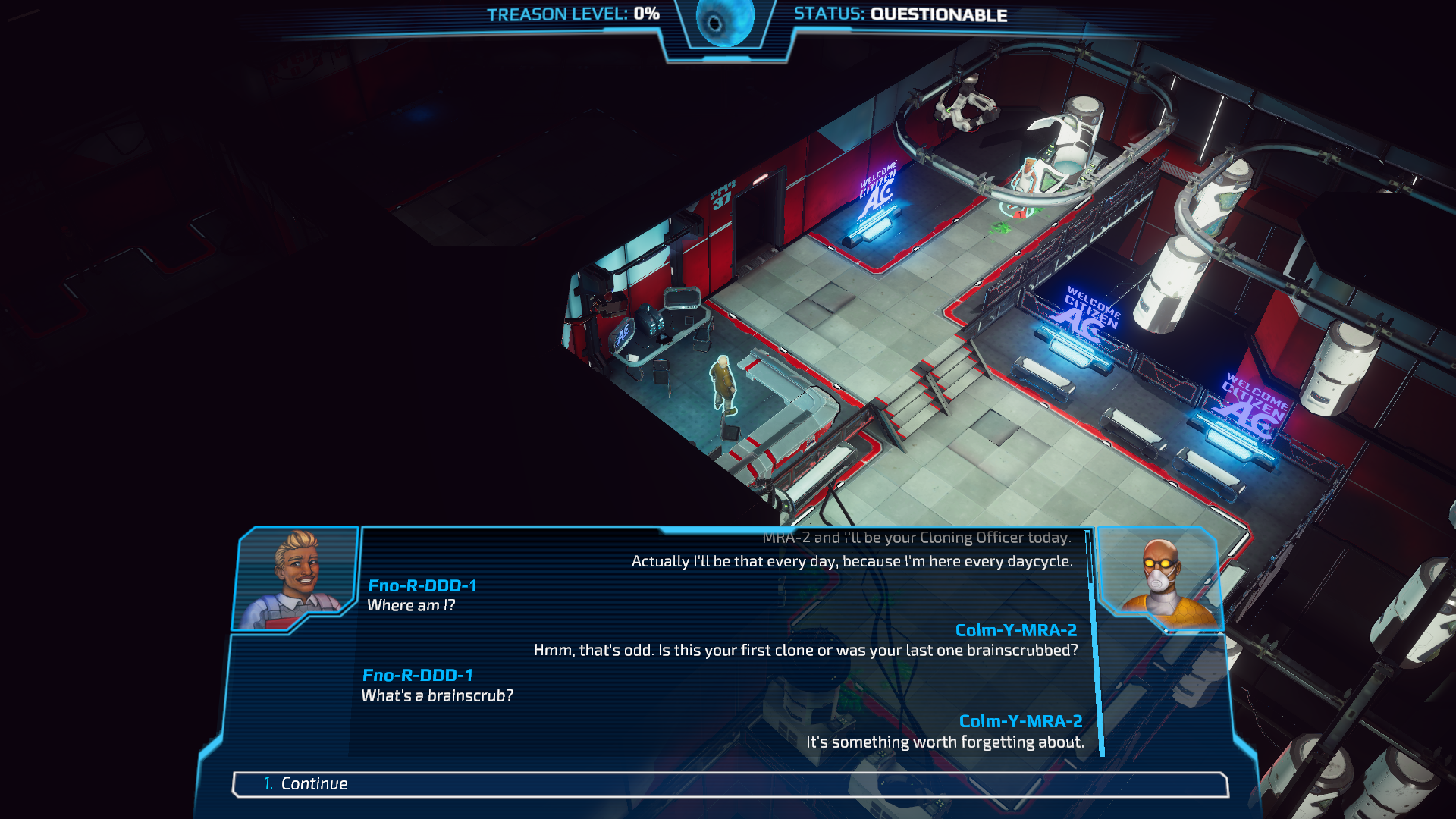
Graphics and sound
Paranoia is not a AAA game. You can tell that quite easily by just looking at it. It’s not a bad looking game, but you’ve not got the highly detailed textures and models you would see in a big-budget title, but what Paranoia has going for it is a consistent art style. Things look slightly cartoony and exaggerated, and for the setting, that fits quite well. You’ve got the often bright and cheerful look juxtaposed to some darker themes, which creates a slightly surreal feeling.
The game’s animations, much like the cartoony looking models, are also often a bit exaggerated for comedic effect. This can be a bit hit or miss, and some animations end up looking a bit too exaggerated, but for the most part, they fit well. But the animations don’t always quite line up with the actions characters take. A grenade might not be thrown at the right point of the animation, or a laser shot might be fired out of the side of your character instead of from the barrel of your gun. It’s usually not very noticeable, but it does happen quite often.
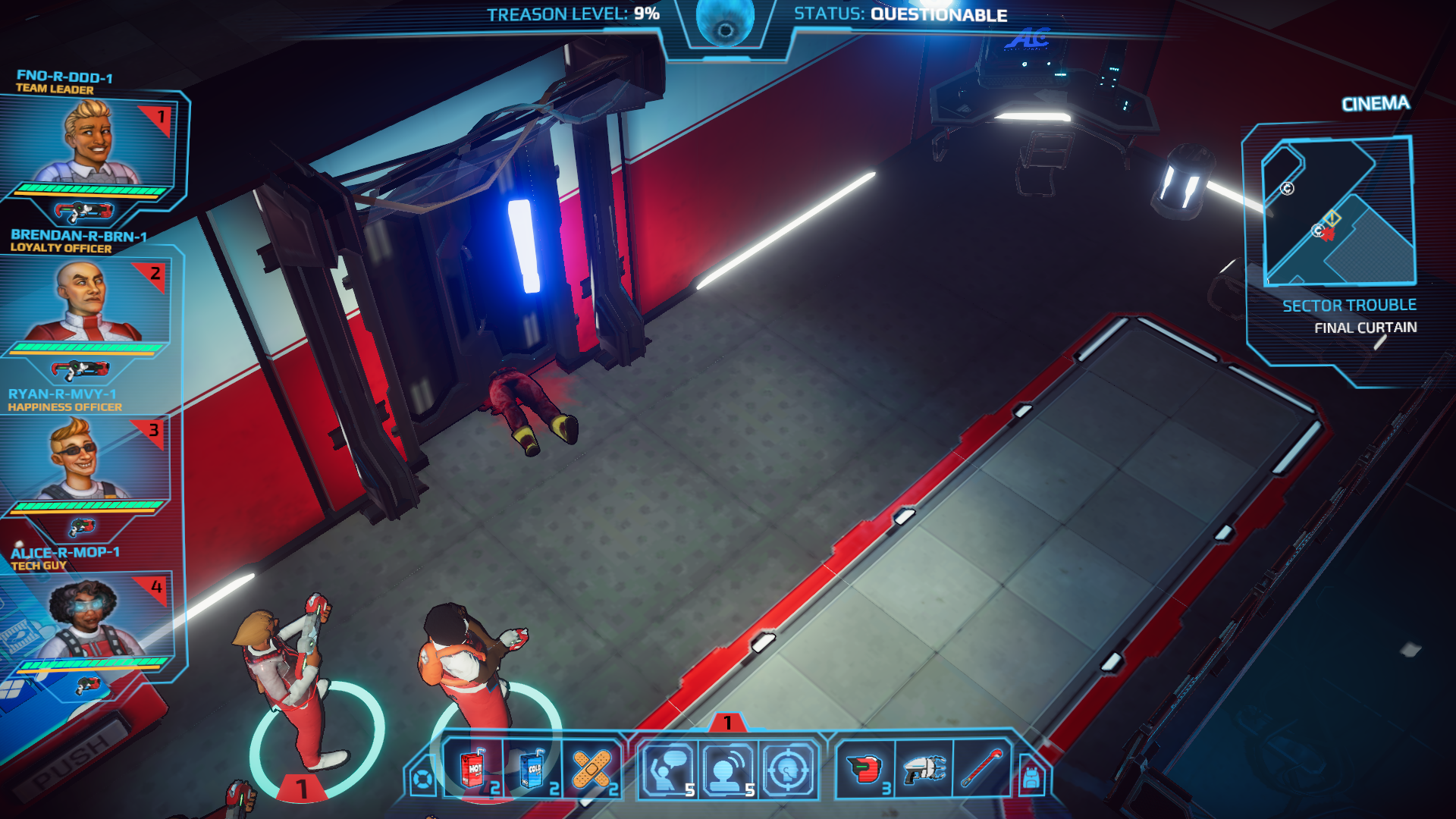
The games sound effects do the job. Most of the weapons in this game are lasers, and there’s very little “omph” to them, but as far as lasers in games go, they’re far from the worst . The non-laser weapons are alright, but there’s nothing outstanding here. Luckily the sound effects are not distracting, which is otherwise a common issue with games that try to be comedic. The game also has surprisingly few music tracks, and again we have something that does its job well enough, without being outstanding. The music feels like it could fit in with most cyberpunk settings, and it does not feel out of place in Paranoia, but you’ll probably not find anyone put it on their list of “best videogame soundtracks”.
There’s no real voice acting in Paranoia, unless the text to speech sounding AI voice lines are really a distorted human voice. It fits at least, what little is there, and it adds some much-needed character to the most important entity in the setting, The Computer.
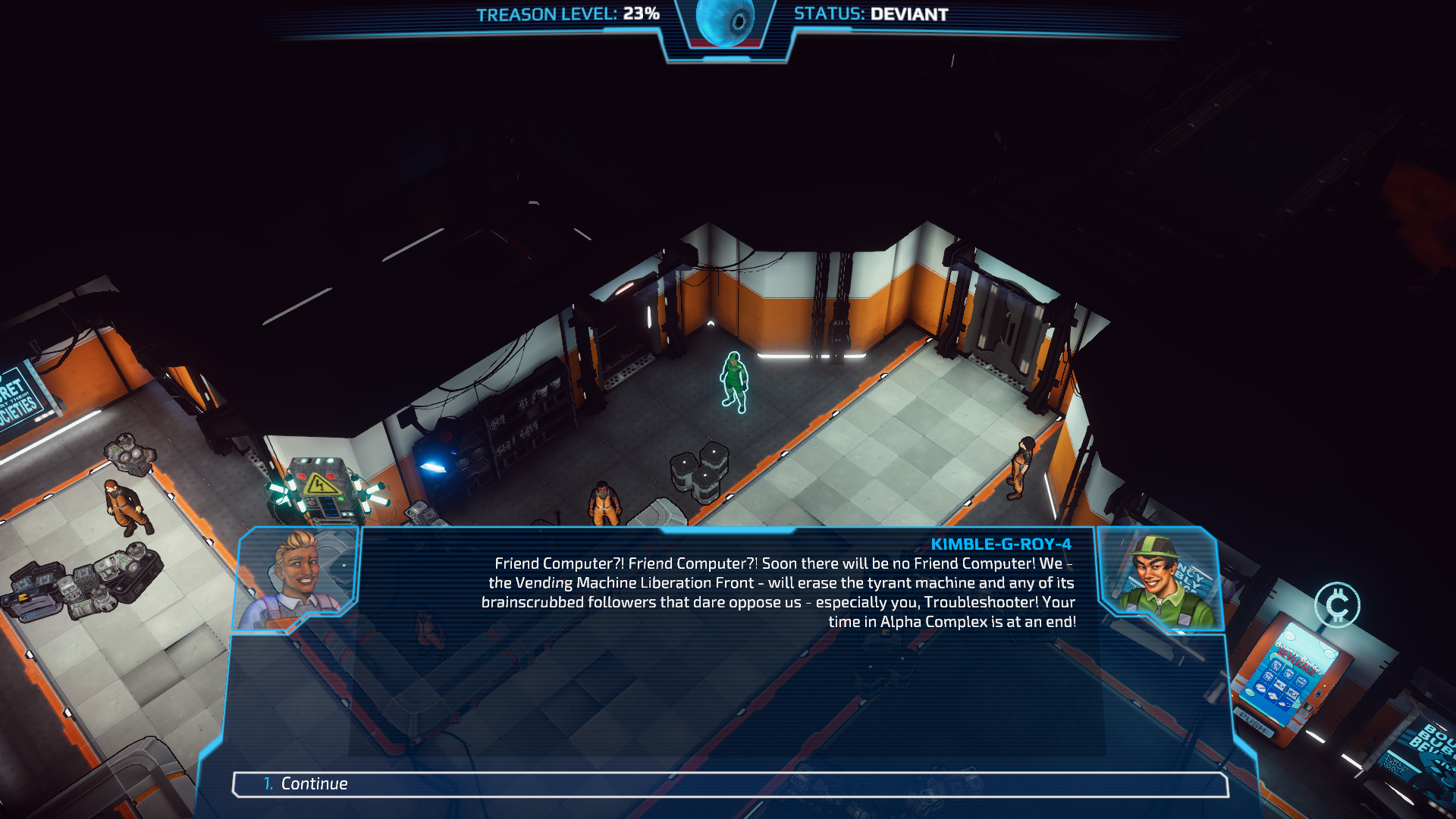
Anyone who has trouble distinguishing between colors might want to be a bit careful with Paranoia. Colors is a central element to the setting, and it denotes your security clearance (basically your rank in the setting), and if you can’t tell the difference between some, you might run into a bit of trouble early on in the game. Later it becomes less of an issue, as you’ll have the “rank” to go into more places, but during the first few hours there are places (denoted by colour) that you can’t go to without getting into trouble.
Setting & Story
At some point in the future something really bad happened, and humanity ended up living in large vaults, ruled over by sentient AIs. You live in one of these vaults, Alpha Complex, which is ruled over by Friend Computer, an omnipresent and flawless AI that cares for you. Friend computer provides you with food, work, friends, and fun, and all it asks in return is that you don’t commit any treasonous actions, stay happy (not being happy is treason), and report or eradicate anyone or anything that might be committing treason. Alpha Complex is a strictly hierarchical society, and rank is denoted by colour, with the people at the bottom being called infrared, and the people at the top being called ultraviolet. You start your career as red, which means that anyone above you (like orange, or green) can boss you around. Not obeying orders from people above you is treason, after all. If you know your color spectrum, then the system will make perfect sense.
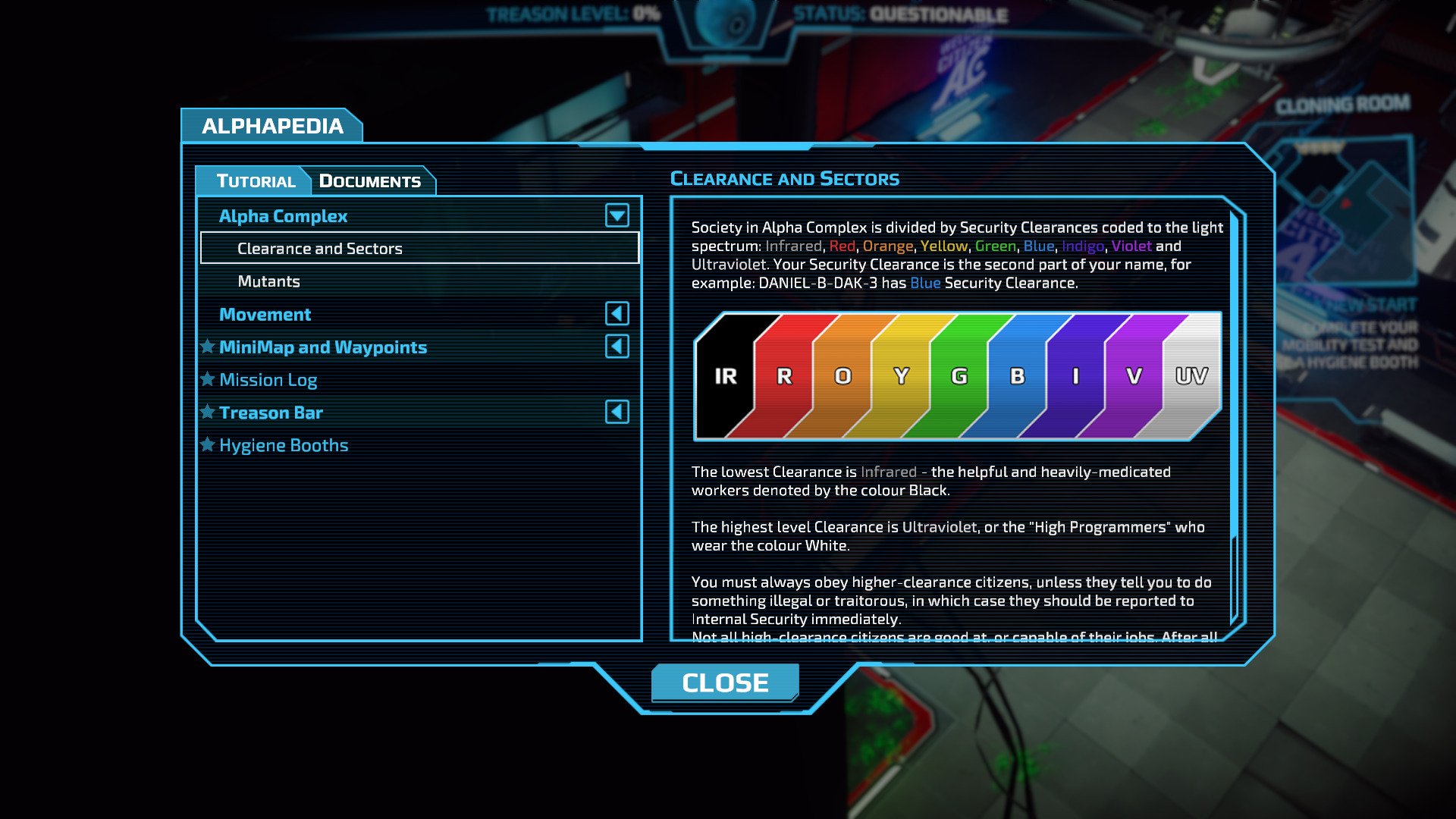
People are no longer created in the old fashioned messy way, but are instead cloned, and everyone has a clone family consisting of 6 members. This effectively functions as an extra life system, and when one clone dies, it gets replaced with the next in line, until you are out of clones.
Paranoia starts with you, a fresh clone from a new batch, being assigned the role of team leader for a band of troubleshooters. You’re basically the person who gets sent out on all the fun and exciting missions, where you get to shoot people. And robots. Sometimes mutants. Basically anything that might be trouble for Alpha Complex and its benevolent ruler, Friend Computer.
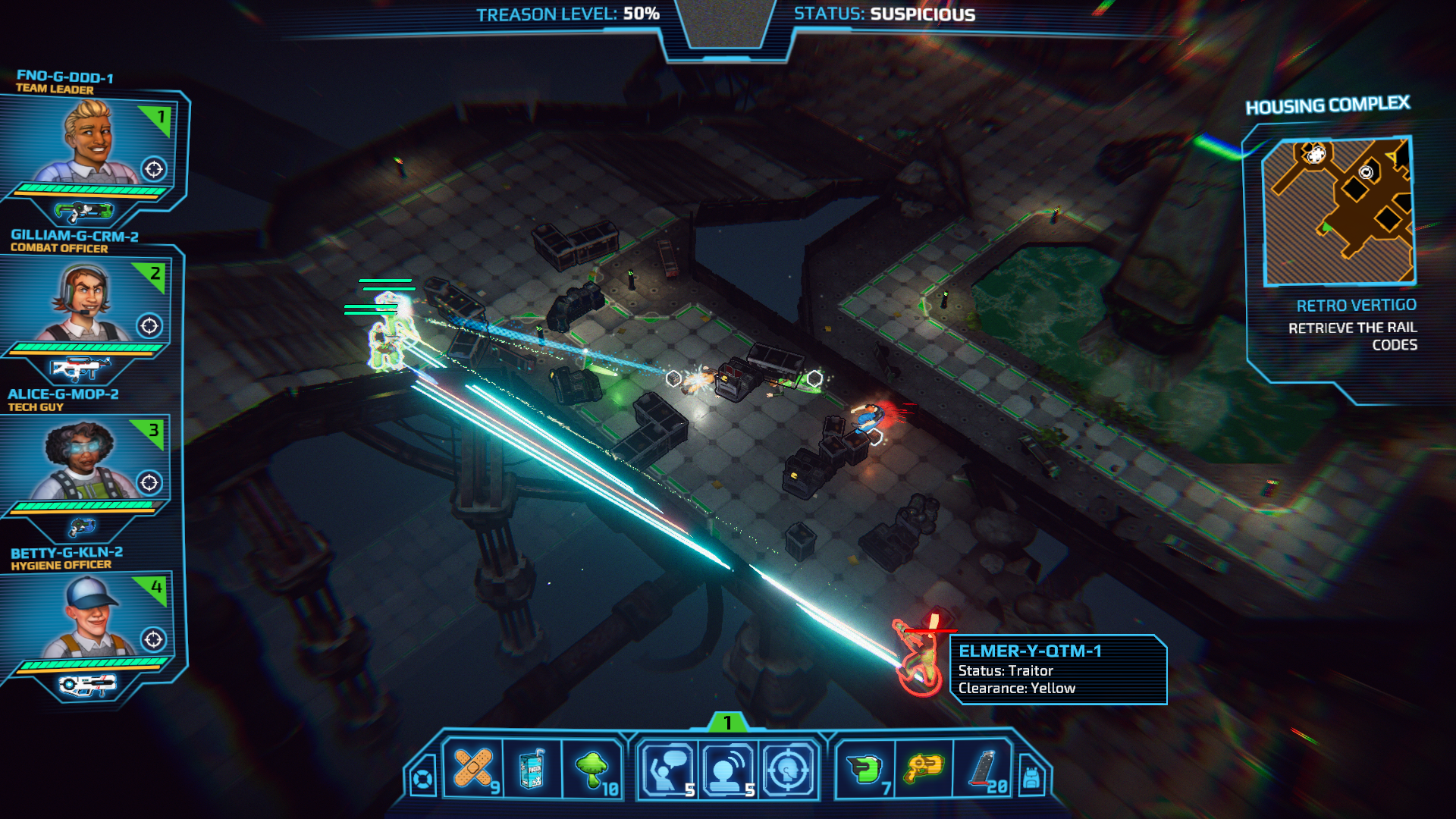
And of course there’s trouble. There are secret societies reprogramming robots to kill loyal citizens, and for some reason, there’s been a large amount of vending machine-related accidents with fatal outcomes. So your job is to find out what’s going on, and what treasonous individuals might be behind all of this. As the story progresses it turns out that the trouble runs deeper than it first seem… (of course it does, otherwise there would not be much of a game, now would it?).
The story starts a bit slow, but picks up pace after the first few missions, but sadly the second half of the game feels more than a bit rushed. As if they had to cut out a fare bit of content late in development, and the developers had to stitch together the pieces to make something coherent. The result is a rather uneven pacing, and that feels rushed, and a bit incomplete.
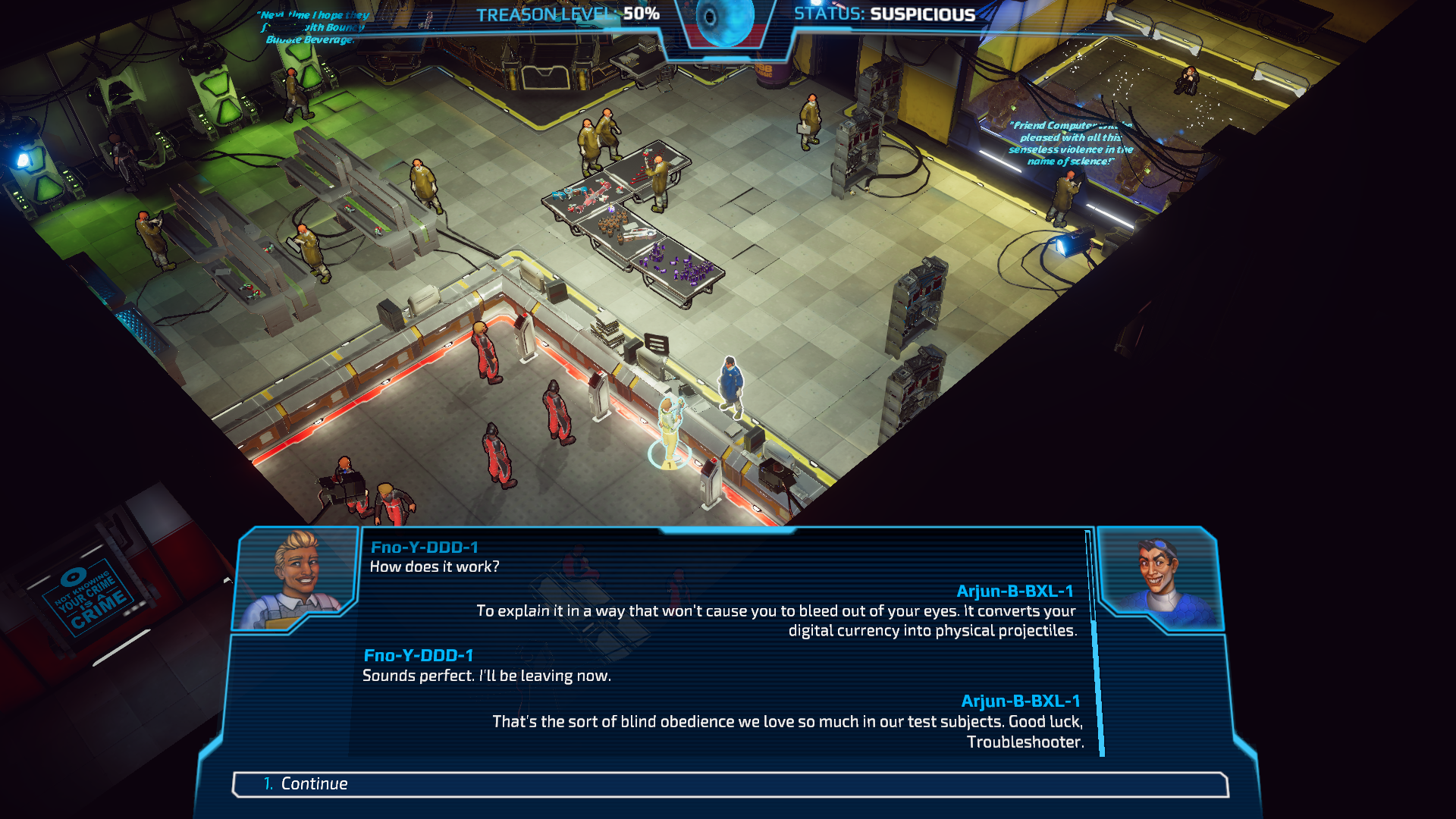
The writing is usually good though, and there are some genuinely really funny moments here. The highlights are the talks with Friend Computer, which is how each mission starts and ends. You need to be careful with what you say, or you might be branded a traitor, and just trying to navigate the dialogue in a way that won’t get you into trouble is surprisingly fun and engaging. There are a few moments like that with other individuals as well, but the standout moments are mostly those related to Friend Computer. And this also does a pretty good job at emulating the feel of the pen & paper RPG, where you really need to watch your tongue when talking to someone who might report you as a traitor if you say the wrong thing. Of course the wrong thing might well be much-needed information about your mission.
Gameplay
Paranoia’s gameplay, much as its story, can best be described as a bit uneven. When it works well, it’s really quite fun, but when it does not, it just feels kind of tedious and repetitive. Combat uses a real time with pause system, meaning that all characters act in real-time, but you can pause at any time to give orders to your team (consisting of you and 3 more characters that you get to chose before the mission starts). Different characters have different strengths, one might be able to reprogram robots to fight for you, another might be able to give a damage reduction buff and so on. But the most important thing to keep in mind during combat is cover, use cover and try to flank the enemy and/or destroy their cover (most things that can act as cover is destructible).
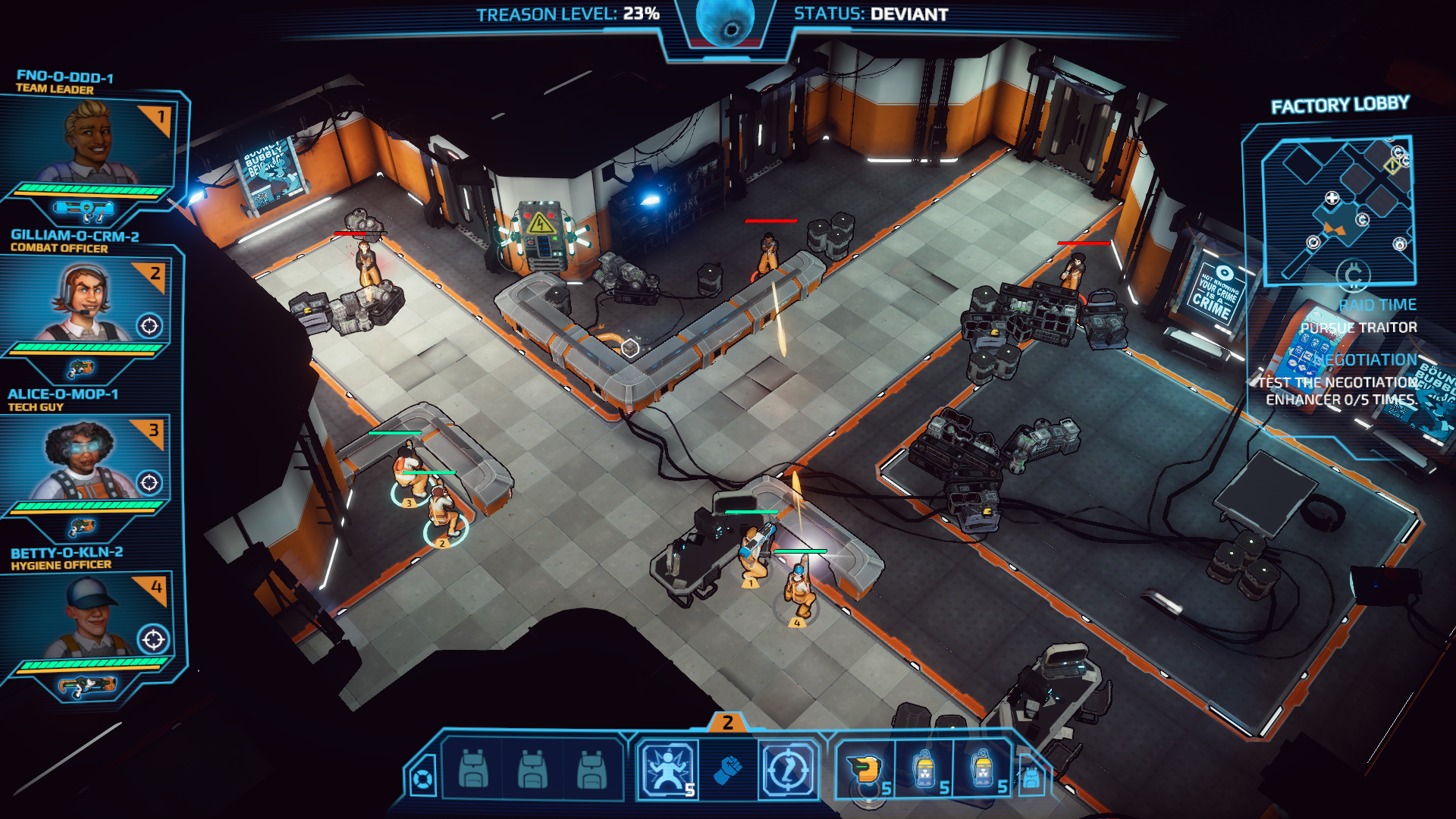
This all sounds fine, but most combat encounters can be beaten by just hiding behind some boxes, shooting at the enemy, and moving to new boxes if the ones you were hiding behind gets blown up. There are times when making more strategic use of cover makes sense, and spreading out the team a bit more is the way to go, but most of the time, just having all 4 selected and just targeting the closest enemy is good enough.
While Paranoia is an RPG, the RPG elements never really take center stage, the way they do in many other RPGs. There are a few skill checks here and there, and the further in you go, the fewer of them there seem to be to the point where non-combat skills feels almost useless (although it’s hard to tell exactly how much your combat skills actually influence things). Your character does level up and gain skill points, although spending them is not quite as straight forward as in most RPGs. Instead of being told that you leveled up you need to die, and get a new clone, which then will have more skillpoints to spend, depending on how far you progressed through the game. This also lets you respec (that is to say, change where you skill points), in case you don’t like the way you’ve spent your skill points. It’s a novel system, that the game does a rather poor job at explaining.
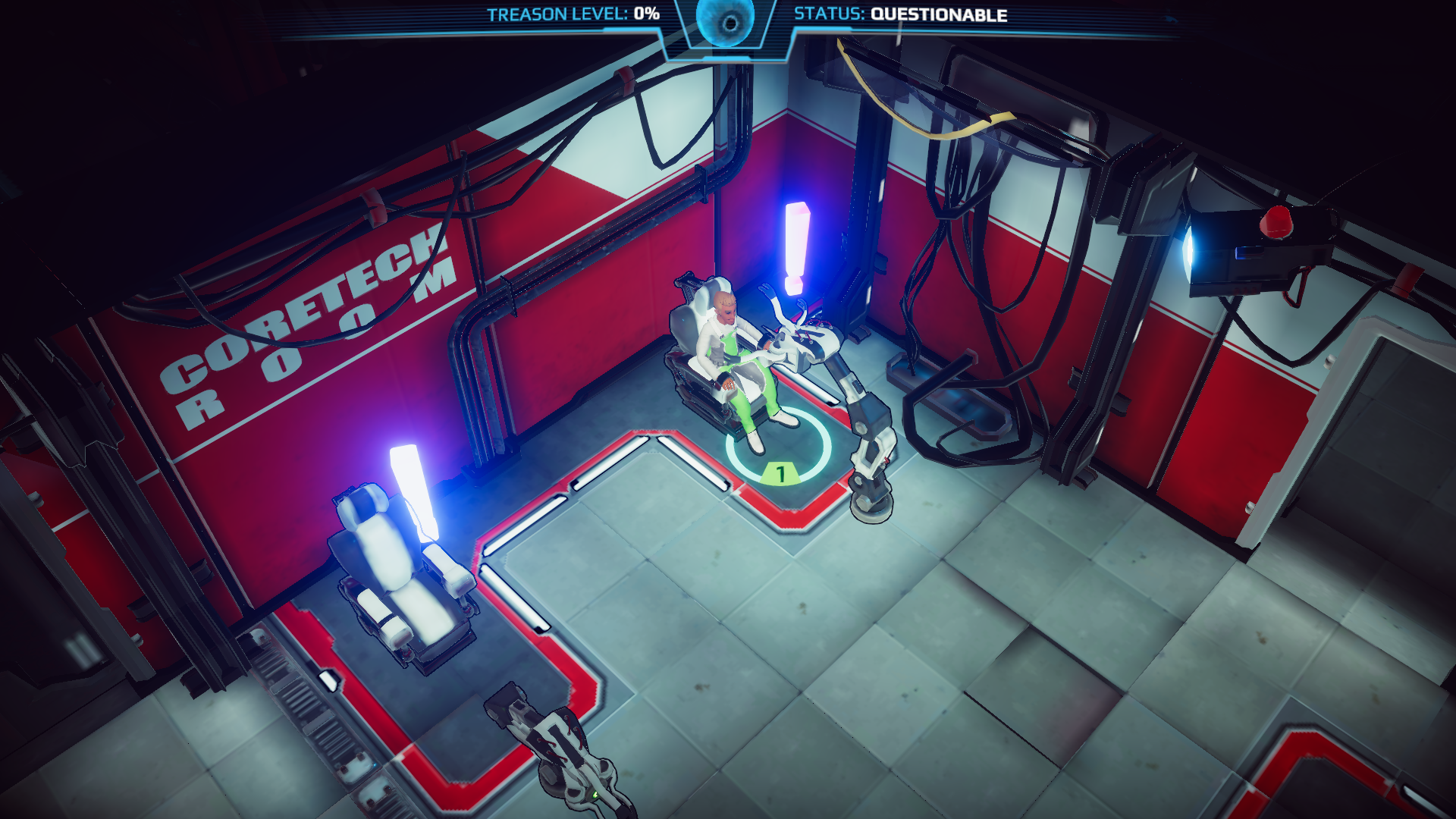
Speaking of explaining things, the games tutorial is not particularly good. It’s really short, and just explains the basic controls, without going deeper into the mechanics of the game. The bad tutorial, combined with a somewhat tedious first mission that does not really teach you how the game is meant to be played does end up giving a bad first impression.
There are moments though when the game really shines. At the end of each mission you have a debriefing with Friend Computer, and in case you’ve been naughty and committed treason, members of your team might decide to tell on you. That is, unless you arrange for “accidents” to happen. Dead clones can’t tell on you. The game could have expanded a lot more on this, but it does result in some interesting choices, when you think someone is going to tell on you. Do you kill them, and spend the rest of the mission being 1 team member short, or do you risk it?
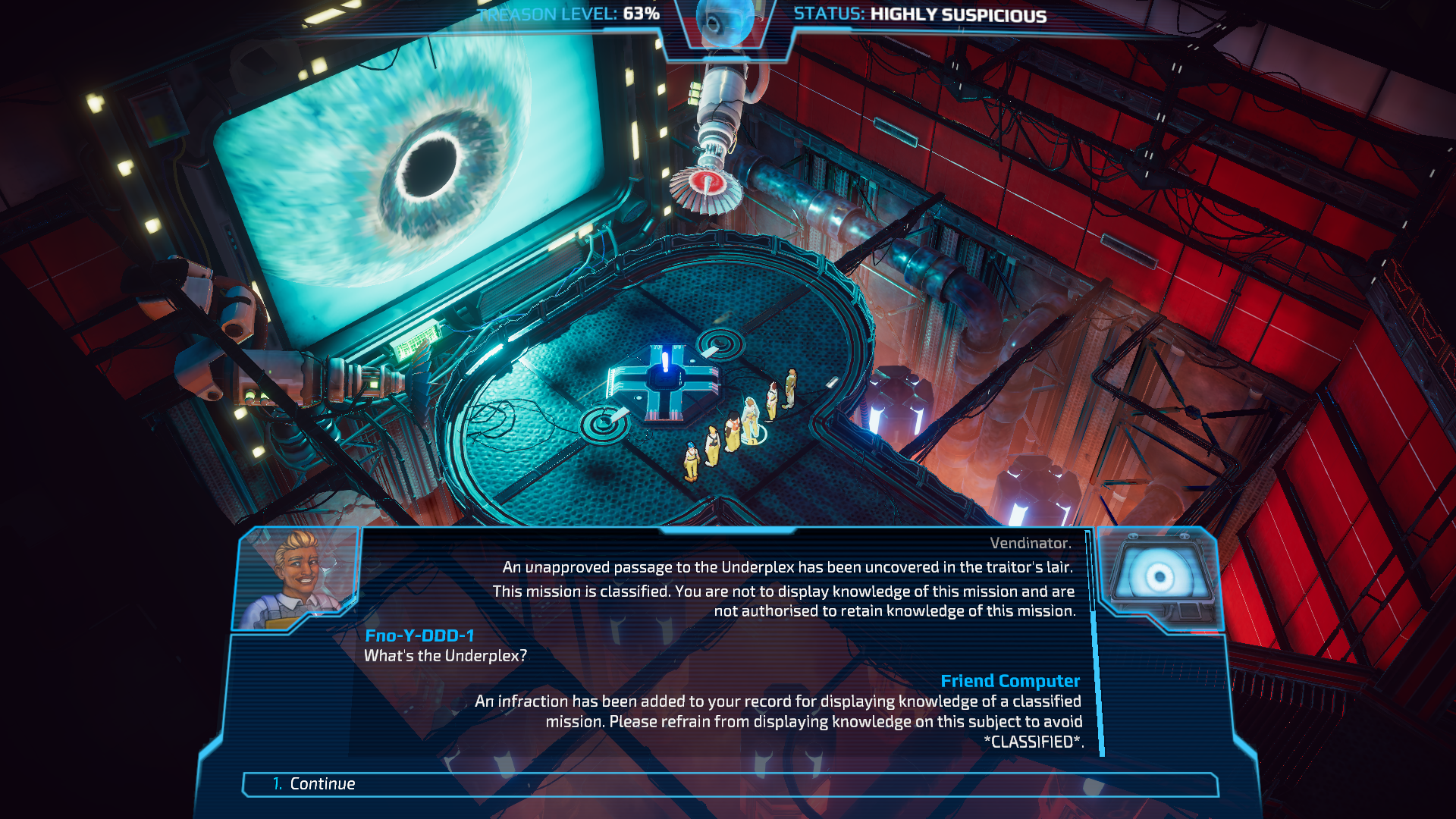
Paranoia is an almost entirely linear game. Most of the game takes place in mission-specific areas, and while there is a “hub” of sort, that you return to after each mission, there’s not much you can do there. You have your debriefing with friend computer, get your equipment, and that’s pretty much it. The other people that wander around won’t talk to you, they’re just there to make the place not feel empty.
Closing Thoughts
Paranoia is a game of highs and lows. At its best, it’s actually really fun. Arranging accidents for team members, trying to figure out what dialogue lines are going to result in me being branded as a traitor is a blast. At its worst, it’s kind of boring, and more than a bit buggy. The game feels like it could have used another half a year (or more) of development.
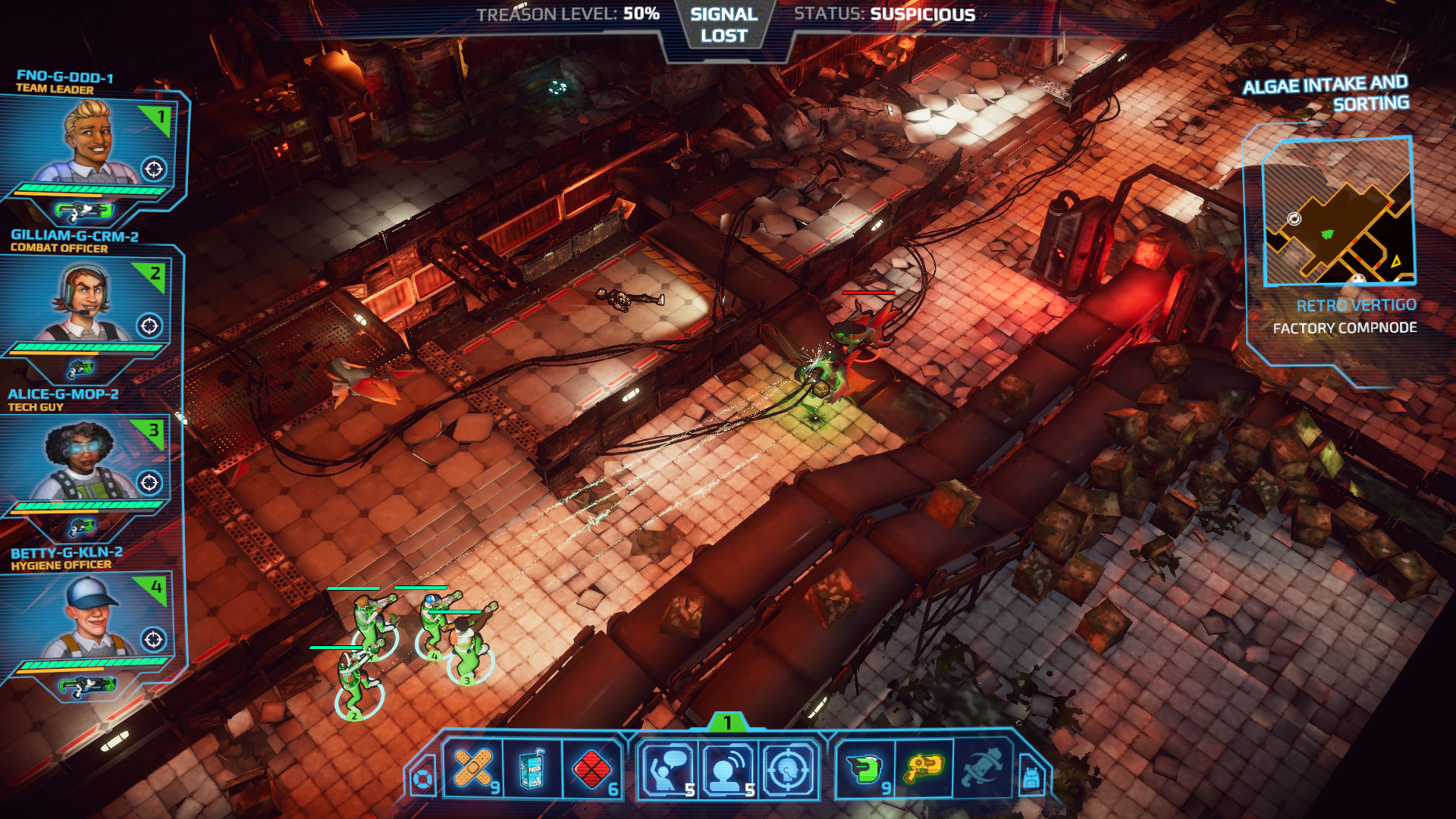
Paranoia is not really a bad game, but take as a whole, it’s not particularly good either. Apart from a few bugs, the game works well enough, it runs well, it does not look or sound too bad, but combat ends up being really repetitive, with the same simple tactics working in almost all combat encounters against enemies with guns (and enemies that just want to run up and hit you in the face are slower than you, so you can just run away from tem). The game also has pacing issues. Some levels feel very short and just end abruptly, and one level in particular is overly long. I suspect that most of these issues boil down to the developers simply not having the time of resources to make the game they really wanted to make more than anything else. If the game had managed to keep the quality and pacing it had during its middle part, this would have been an easy recommendation, because I really enjoyed the game then, to the point where I was looking forward to booting it up again every time I had to turn it off. But sadly both starts and ends rather poorly, leaving both a bad first and last impression. And then the game somewhat abruptly ends, with some plot threads feeling like they were left hanging.
I do think that there will be a few people out there who will really dig this game though, people who can overlook its pacing issues and often somewhat boring gameplay, and instead focus on the games enjoyable writing, themes and setting, and particularly those who are already big fans of the setting might get a kick out of it. But for everyone else, Paranoia won’t really make you happy.










